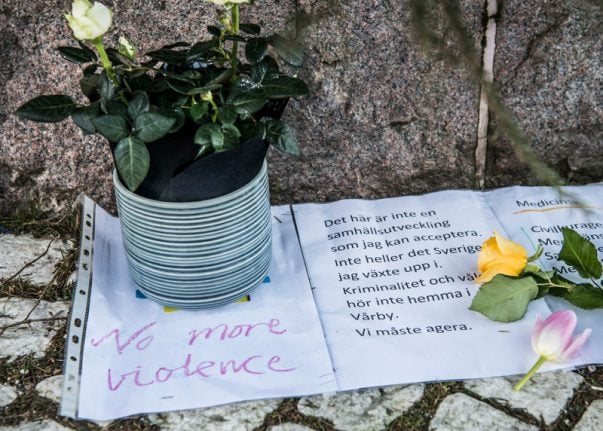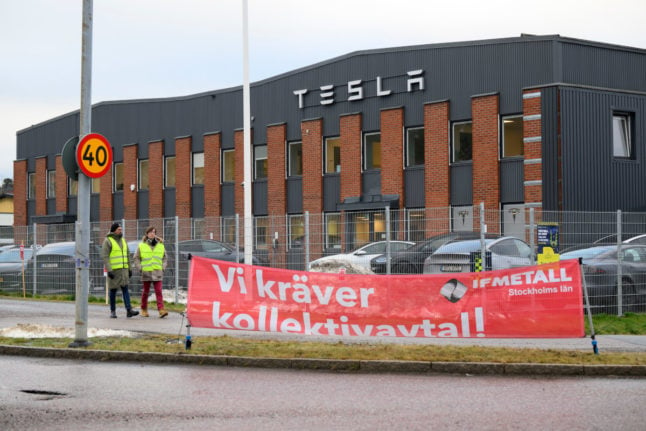
CRIME
Swedish National Police chief: Murder levels must come down
Forty-three people were shot to death in Sweden in 2017 and the new year has not shown many signs of improvement.
Published: 21 January 2018 16:46 CET

Flowers left after a recent violence incident in Stockholm. Photo: Tomas Oneborg/SvD/TT
Responding to the deadly spate of violence amongst criminal elements in Malmö, Gothenburg and Stockholm, the chief of the Swedish National Police vowed to do better.
“It's hard to eliminate murders altogether, but we have to get the levels down considerably,” Dan Eliasson said.
Eliasson’s police force has plenty to contend with. Just a few days ago, an explosive was detonated outside of a police station in the Rosengård district of Malmö in what police called “a response from criminals”. Not long before that, a police car parked outside a police station in central Malmö was damaged in an explosion.
Meanwhile, two young men were recently shot dead in the Stockholm suburb of Rinkeby and there were also recent killings in Helsingborg, Sundbyberg and Malmö.
During a visit to Malmö this week, Eliasson said “it is important to ensure that the fatal violence doesn’t escalate”.
“The potential for violence that we have seen in [the Stockholm suburbs of] Rinkeby, Tensta and Husby, and in Malmö, is significant. Things move fast when criminal networks start shooting each other. We do not want to see that. We want to stop it,” he said.
Last year, 43 people were shot and killed in Sweden and over 300 shooting incidents were recorded. The vast majority of cases are linked to ongoing gang conflicts. At the same time that gang-related killings are increasing, other violence cases actually fell by roughly three percent in 2017.
SEE ALSO: In figures: 2017's shootings in Sweden
As The Local has previously reported, official figures have shown that deadly violence has decreased in Sweden compared to the 1990s, but the number of gun deaths appears to be on the rise.
Eliasson said it is “time for us to show that we can break the trend”.
“We will do that in 2018, I have great hopes that it will be done. To put it another way: we must not fail. We need to improve our results in this area,” he said.

National Police Chief Dan Eliasson. Photo: Fredrik Sandberg/TT
The National Police chief said that getting people to speak to up would go a long way in bringing the deadly shootings down.
“I think there is a certain understanding within the gang environments that those affected by these fatalities do not want to contribute to the police investigations,” Eliasson said.
Even among the general public, Eliasson said there is a hesitancy to testify in gang-related cases.
“I am genuinely worried about the will of the public to tell us what they saw in cases of fatal or serious violence. The willingness to testify is not as great as the Swedish police would like. We can provide protection but too many choose not to tell us what they have seen and heard,” he said.
Figures released by Sweden's National Council on Crime Prevention (Brå) last week showed that Swedes are increasingly worried about the country’s crime levels.
Eliasson said that tightened weapons regulations that came into effect at the outset of the year would prove to be a powerful tool against organized crime. Under the new regulations, people suspected of serious violent crimes can be detained immediately. Police will also be given new opportunities to swoop up criminals on lower charges that are suspected of being involved in something more serious.
“Sometimes we do not achieve success in murder investigations even though we really know who did it. If we can pick that person up for drugs or weapons violations and and deprive them of their freedom, that goes a long way toward creating security in our society,” he said.
Despite growing gang violence and increasing unease amongst Swedes, police stress that the risk of being a victim of violence is still small.
“Swedes should continue to live as usual. Then there may be situations in which you should be vigilant, but Sweden is basically a safe country,” Eliasson said.
Url copied to clipboard!


 Please whitelist us to continue reading.
Please whitelist us to continue reading.